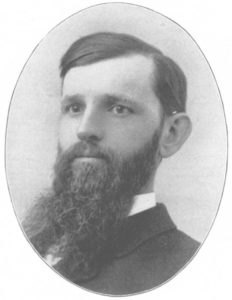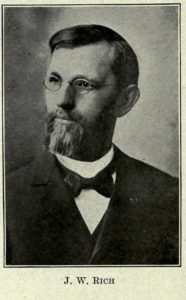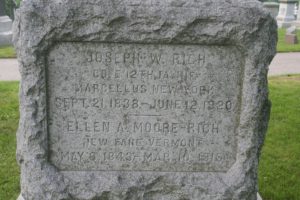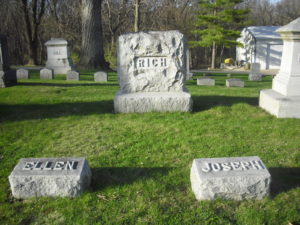



Joseph Warford Rich
Joseph W. Rich was the president of the Library Board at the time of its dedication on November 29, 1905. Although he had not been one of the original members of the Board appointed in 1897, he had been named to the Board by Mayor F.K. Stebbins to replace Congressman Martin J. Wade in 1903 and was immediately elected President.[1] A disagreement over the authority of the President versus that of the Librarian caused Rich to hand in his resignation in October of 1904, but the board withheld its acceptance of his leaving the office until after the dedication ceremonies.[2] His resignation was accepted in December 1904, with William P. Coast as his successor as President.[3] While Rich continued serving as Trustee until 1917, he never held another office.[4]
Joseph Warford Rich was born September 21, 1838, in Marcellus, Onondaga County, New York.[5] His parents, David and Maria Jay Rich had emigrated from England in 1830, just one month after their marriage, settling first in New York where Joseph was born. When Joseph was around seven years old the family joined the westward migration settling in Illinois in 1845 for a few years before finally settling in Iowa in 1856.[6] In 1861, Joseph joined Company E of the 12th Iowa Volunteer Infantry, taking part in the expedition to Fort Henry and the capture of Fort Dennison in February 1862.[7] He also served at the Battle of Shiloh in April 1862 on which subject he published a book in 1911. After the war, Joseph returned to Iowa and taught school for a few years while attending the University. He married Miss Ellen Abigail Moore on September 10, 1868, a woman of note in her own right as one of the first graduates of the University and who also served on the Board of Trustees for the Library later in life. In 1871, Joseph became Editor of the “Vinton Eagle” and spent the next sixteen years in the newspaper business. From 1886 to 1892, he served as a member of the Board of Regents of the State University of Iowa before taking the position of University Librarian from July 1892 – June 1898.[8] His later years were spent serving the Library Board and the Board of Curators of the State Historical Society of Iowa continuously advancing the availability and access to educational materials and opportunities for all. Ellen died on March 10, 1915 and Joseph died on June 12, 1920. The couple had no children but spent their lifetime promoting the education of their community.
-Dr Melissa Stewart
[1] Eggers, Lolly Parker, A Century of Stories, The History of the Iowa City Public Library, p. 116.
[2] Iowa City Press Citizen, Iowa City, IA, 22 October 1904, p. 5.
[3] Iowa City Press Citizen, Iowa City, IA 22 December 1904, p. 8.
[4] Eggers, p. 122, p. 433.
[5] Joseph & Ellen Rich Tombstone, Oakland Cemetery, Iowa City, Johnson County, Iowa.
[6] Iowa City Daily Republican, 21 July, 1888, Obituary of David Rich.
[7] University of Iowa Yearbook, 1912, p. 178.
[8] Iowa Journal of History and Politics, Vol 18 (1920), pp. 471-72.